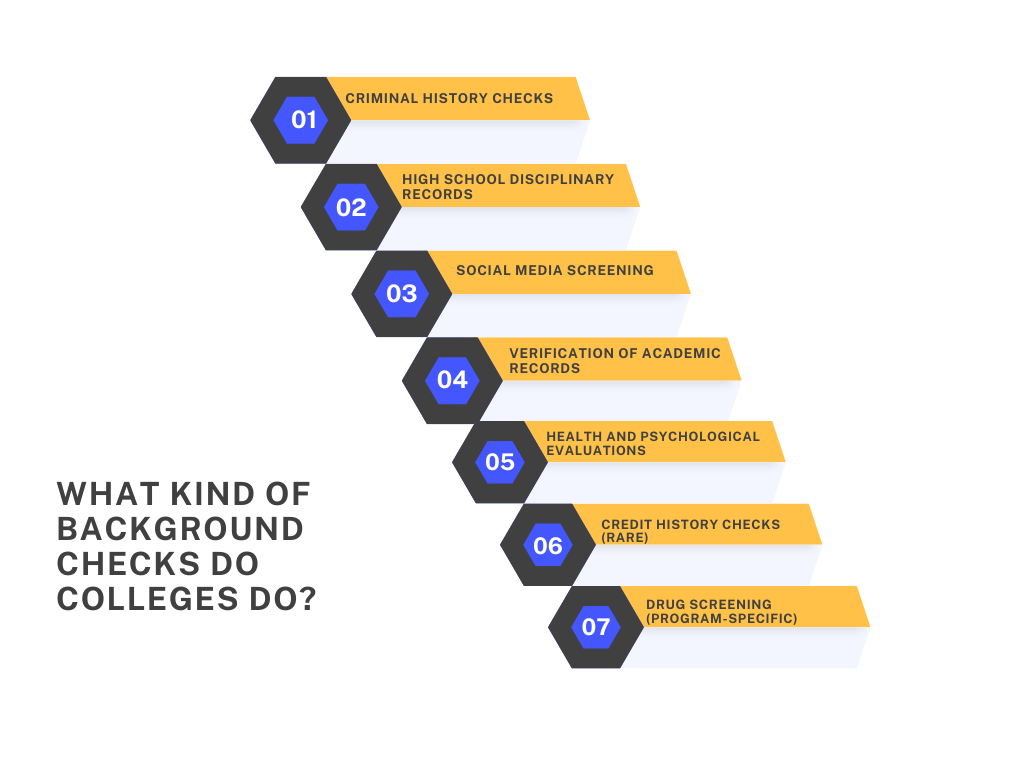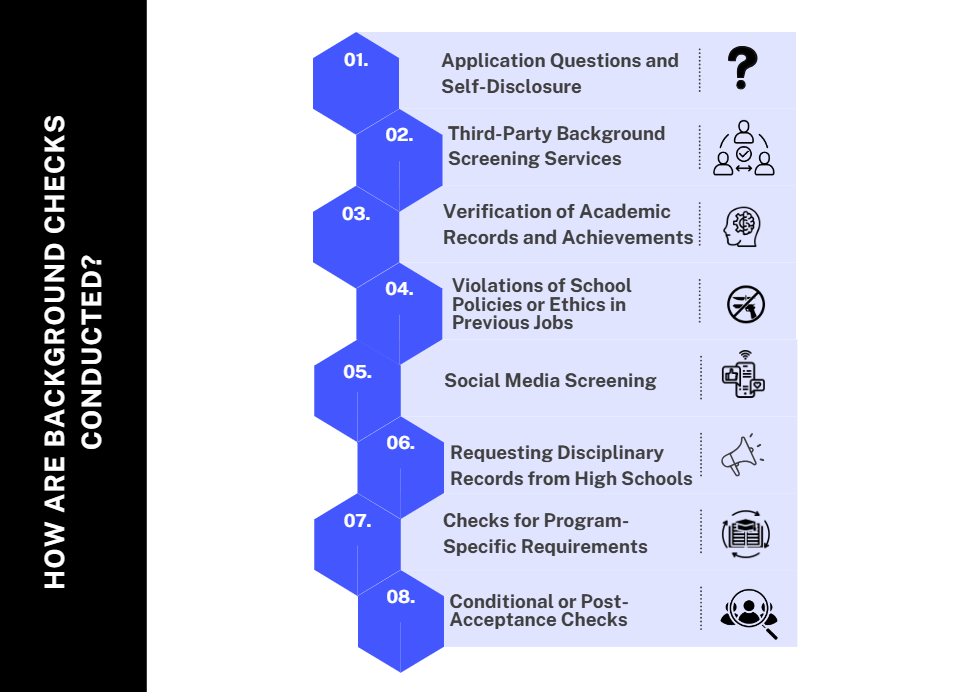Do Colleges Do Background Checks?

Colleges and universities have become more diligent in their admissions processes in recent years, including background checks. Many applicants wonder: Do colleges do background checks? The answer is yes, colleges do run background checks on applicants for a better hiring and to reduce hiring bias. However, this only sometimes means you will be rejected because of it. Colleges run background checks for various reasons, primarily to maintain a safe environment for all students in any education sector.
In this article, we will explore why colleges perform background checks, what kinds of checks they do, and how they impact your admission. We will also look into the ethical and privacy considerations surrounding these checks. By understanding the process, applicants can better prepare themselves for the admissions process.
What is a College Background Check?

College background checks are a type of background check done to ensure the safety of students and faculty. Since many students will be living in campus dormitories, colleges primarily look for criminal records related to sexual offenses, violent behavior, or drug and alcohol-related arrests. In some cases, background checks also help colleges meet the requirements set by affiliation agreements or insurance providers.
While this provides an extra level of privacy, it does not offer complete protection. Private accounts can still be accessed under certain conditions, emphasizing the importance of being aware of the limitations of privacy settings.
Why Do Colleges Run Background Checks?
Colleges and universities perform background checks to keep students and faculty members safe. These checks help colleges prevent dangerous situations on campus. For example, many students live in campus dormitories, and ensuring that they are not admitted with a history of violence or sexual offenses is essential for creating a secure environment. In addition, some programs may require background checks to meet specific safety or legal standards.
70% of job applicants have lied or would consider lying on their resumes. The same applies to applicants for colleges. As the admissions process becomes more competitive, some applicants may try to hide their pasts. Colleges want to verify the information provided to them and ensure that applicants are not omitting critical details that could affect their safety.
For more information about how background checks can help reduce hiring bias, click here.
What Kind of Background Checks Do Colleges Do?

Colleges do several types of background checks to assess applicants. These checks help ensure the safety and well-being of the student body. Some of the common types of checks include:
1. Criminal History Checks
Criminal history checks are one of the most important background checks conducted by colleges. Colleges look for any convictions related to violence, sexual offenses, or drug-related offenses. If an applicant has a criminal history, it may raise a red flag. Colleges typically look at recent convictions to ensure that the student does not pose a threat to the campus community.
2. High School Disciplinary Records
Colleges also request high school disciplinary records to evaluate how an applicant has behaved in the past. These records help colleges assess whether the applicant has a history of disruptive behavior that could affect their performance at the college level.
3. Social Media Screening
Social media screening is becoming increasingly important in the college admissions process. Colleges may review applicants' social media profiles to gain a deeper understanding of their character. Admissions officers may check for any inappropriate posts or behavior that could be concerning.
For more details on the importance of social media screening, click here. For a more comprehensive view of the social media screening, click here.
4. Verification of Academic Records
Colleges verify academic records to ensure that applicants have the qualifications they claim to have. This verification includes checking high school transcripts, grades, and standardized test scores. Colleges may also verify whether applicants have received diplomas or degrees from accredited institutions.
5. Health and Psychological Evaluations (For Specific Programs)
For some specialized programs, colleges may require health and psychological evaluations. These evaluations help colleges determine whether applicants are fit to handle the demands of certain programs, such as those in healthcare, psychology, or other high-stress fields.
6. Credit History Checks (Rare)
Although credit history checks are rare, some colleges may look into an applicant's financial background, particularly for students applying for certain programs. This is more common for graduate or professional programs, where financial responsibility is considered an important factor for admission.
7. Drug Screening (Program-Specific)
Certain programs may require drug screening to ensure that applicants are not involved in drug use. This is typically done for programs that involve working with vulnerable populations, such as healthcare or law enforcement programs.
Background check with AI can help streamline the process of conducting these checks. To learn more, visit this link. If you're interested in seeing how this process works, you can Request a Demo here.
How Are Background Checks Conducted?

Background checks typically start by verifying an applicant's identity using their Social Security number and date of birth. This helps ensure that the information being checked corresponds to the correct individual. Once identified, background checks may include a search through court records, financial records, or public records databases.
In addition, colleges may directly contact previous educational institutions, professional organizations, or previous employers to gather further information.
1. Application Questions and Self-Disclosure
Many colleges ask applicants to disclose any criminal history or past disciplinary issues directly on their application forms. Applicants may be required to provide details of any offenses, charges, or arrests. This helps the college assess their application more thoroughly.
2. Third-Party Background Screening Services
Some colleges use third-party background screening services to conduct criminal checks, social media screenings, and verify academic records. These services help streamline the process and ensure accuracy.
3. Verification of Academic Records and Achievements
Verification of academic records includes confirming the applicant's high school or previous college graduation, test scores, and grades. Colleges may contact previous institutions to ensure that the information provided is accurate.
4. Social Media Screening
Social media screening is a growing trend. Colleges may check applicants’ public social media profiles to assess their behavior and interactions online.
5. Requesting Disciplinary Records from High Schools
Colleges often request disciplinary records from high schools to evaluate an applicant’s past behavior. These records help colleges determine if an applicant has a history of misconduct that could be relevant to their campus environment.
6. Checks for Program-Specific Requirements
Some programs may have specific background check requirements, such as health assessments, criminal history checks, or drug screenings.
7. Conditional or Post-Acceptance Checks
Some colleges perform background checks after an applicant is accepted, often as a condition for enrollment. These checks can be a form of due diligence to ensure the applicant is fit for admission.
Do Colleges Look at Criminal Records?
So, do colleges run background checks? Yes, colleges do run background checks. However, this does not necessarily mean you will be rejected based on your criminal record. Whether you will be accepted depends on the type of background check, the nature of the crime, and how recent it was.
Does a Background Check Impact Admissions Decisions?
Although collected, some colleges report that they do not consider it in the admissions decision. However, private schools and four-year institutions are more likely to take a criminal history into account compared to public or two-year schools.
Do Colleges Check Social Media?
Though not all colleges look at your social media, there is still a chance it could influence your admission. Therefore, it is important to be cautious about what you post online. Colleges may find social media profiles through applicants' applications or by searching online.
For more on the benefits of social media screening, click here, and to understand more about doing a background check, click here.
How Far Back Do Colleges Look at Social Media?
Colleges may review social media activity dating back several years. Inappropriate content or behavior can negatively affect your application, especially if it conflicts with the values of the institution.
Ethical and Privacy Considerations
Background checks raise ethical and privacy concerns. Colleges must ensure that they are not violating applicants' rights by accessing information they are not legally allowed to use. The Fair Credit Reporting Act (FCRA) governs how background checks must be conducted to ensure compliance with privacy laws.
Do Colleges Do Background Checks on Parents?
Colleges do look into your parents' backgrounds, but their primary focus is on your academic achievements and financial status. This information is used to understand your personal situation better.
Can Colleges See Private Accounts?
While colleges typically do not have the means to access private social media accounts, applicants should still be cautious. What you post publicly can influence the admissions process.
How Can Applicants Prepare?
To prepare for background checks, applicants should be honest about their pasts. It’s also a good idea to clean up social media accounts and avoid posting anything that could be interpreted negatively.
Do Colleges Find Out About Arrests?
Yes, colleges do find out about arrests. If you have been arrested, be upfront about it. Colleges may consider the nature of the arrest and whether it affects your ability to be a responsible student.
Do Internships Do Background Checks?
Some internships may conduct background checks, especially those related to sensitive or high-risk industries. Be prepared for background checks if you’re applying for internships.
How Ferretly Helps Colleges in Doing Background Checks
Ferretly offers AI-driven background screening solutions to streamline the background check process. With a focus on social media screening and risk assessments, Ferretly helps colleges quickly verify applicant information and ensure student safety.
Request a Demo to learn more about how Ferretly can help your institution.
Frequently Asked Questions
1. How Do Colleges Check Backgrounds?
Colleges use third-party background screening services to run checks, looking for criminal history, social media activity, and other public records.
2. Can Colleges Look at Your Social Media?
Yes, colleges may check social media profiles to ensure applicants maintain appropriate and professional online behavior.
3. What Do Colleges Look for in a Background Check?
Colleges look for criminal history, disciplinary records, academic verification, and sometimes social media activity.
4. Do Colleges Check for Arrests?
Yes, many colleges check for criminal history, including arrests, to assess any potential risks.
5. Do Colleges Perform Background Checks on Parents?
Colleges do not usually check parents' criminal backgrounds, but they may look at their educational background to understand the student's context.
Conclusion
Colleges do conduct background checks to ensure a safe and secure environment for all students. Understanding the types of checks performed and the reasons behind them can help you prepare for the admissions process. Be transparent about your background and clean up your online presence to present yourself in the best light.






